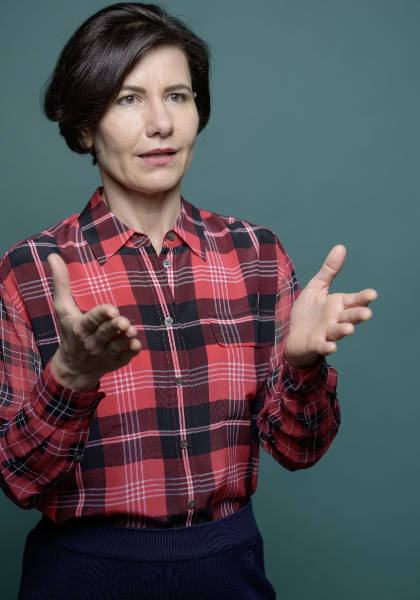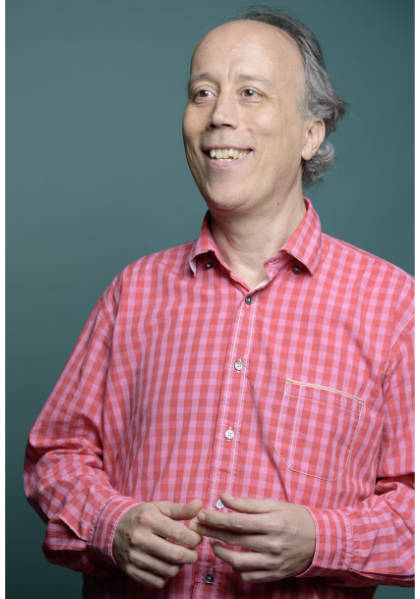Off Balance

Polina Lukicheva, Philippe Tobler, this spring semester you organized a topical lecture series at UZH on the subject of uncertainty, featuring prominent guest speakers from around the world. As a result of wars, crises and AI, we feel that we’re living through uncertain times in which old certainties no longer apply. Do you share this impression?
Philippe Tobler: Viewed in historic terms, we live in relatively settled times. We have become used to this and therefore perceive unsettling developments and events all the more keenly. There have been several examples of such events in the past few years – economic instability due to inflation and interest rates, an increasing awareness of climate change, geopolitical tensions. For many people, it’s the first time they are witnessing a threatening war on European soil. And Covid-19 was a very incisive event that caused a feeling of uncertainty regarding public health and put our trust in institutions to the test.
Polina Lukicheva: The feeling of living in particularly uncertain times may also be a reflection of our “present-time bias” – the present often appears less stable to us than the past. But has the world ever been truly stable? Even in the West, it would be hard to find a generation that hasn’t experienced significant turmoil – world wars, financial crises, societal upheavals. The collapse of the Soviet Union was a geopolitical shock with global consequences that are felt to this day. Nine Eleven, the 2008 financial crisis, the pandemic, the war in Ukraine – cataclysms seem to be the rule rather than the exception in a retrospectively often exaggerated image of global stability.
Uncertainty causes stress within individuals and society. They appear to be bad for us. Is that true?
Tobler: Uncertainty can indeed cause us stress – this can also be observed at the physiological level, for instance through raised stress hormone levels and increased activity in fear-related regions of the brain. Because of this increased stress reaction, long lasting uncertainty in particular is bad for our mental and physical health. But uncertainty can also be an opportunity, it can prompt us to do something new, for instance, and learn from it.

Technical skills now become outdated so fast that many people live in a permanent state of adapting – or of falling behind.
What did you yourselves learn from the presentations and podium discussions at the topical lecture series you organized?
Lukicheva: Renowned researchers – including several speakers in our lecture series – don’t just see the current phase as a succession of crises but as a possible tipping point. The physicist and risk and complexity researcher Didier Sornette spoke about the end of a global regime. The illusion of the perpetual money machine – an economic model that for decades was based on debt, speculation and wealth inflation – created apparent stability, but in truth led to fragility, inequality and systemic risk.
A further, comparatively new factor and possible indication of a qualitatively altered dynamic that many speakers in our lecture series emphasized is acceleration. Climate change is an example of this. The earth’s climate has always fluctuated, but the change we see today is occurring at an unprecedented speed. It’s a similar scenario with technological developments. Systems emerge and disappear before they become firmly established, and technical skills become outdated so fast that many people live in a permanent state of adapting – or of falling behind. Expectations shaped by experience go unmet.
What are the consequences of this?
Lukicheva: Ultimately, it’s about a shift in the conditions of understanding itself – this is perhaps one of the most fundamental dimensions of the current uncertainty. What we’re experiencing aren’t just political or economic uncertainties – it’s a radical epistemic change. The American complexity and evolution scientist David Krakauer speaks of a revolution of comprehension – if knowledge is the attempt to render the world comprehensible, then we face greater uncertainty today. Not just about what is happening and what is going to happen, but whether we can still comprehend it. It’s a crisis that relates to our confidence in the actual ability to orient ourselves.
People vary in how well they deal with uncertainty. What’s required to successfully live with uncertainty?
Tobler: We have to believe that when faced with an uncertain situation we can learn something from the results of our own actions. In general, learning helps to minimize uncertainty as far as this is possible and to define it more precisely. In economics, uncertainty is divided into ambiguity and risk. With ambiguity, the probabilities of possible events aren’t known. With risk on the other hand, the probabilities are known. The lottery is a good example of this. People typically avoid both ambiguity as well as risk. Through learning we can acquire information on the probability distribution of events, meaning we can transform ambiguity into risk and thus to some extent reduce uncertainty.
Lukicheva: What’s key is to recognize uncertainty as a normal state – not as a disruption but as a fundamental condition. From an evolutionary perspective, that’s precisely what it is – living systems act under conditions of incomplete information. Dealing with the real world always means living with uncertainty. If that holds true, then the next step lies in understanding uncertainty not solely as a threat but also as a space of possibility. Asking ourselves under these conditions what exactly is to be considered or what has to be renegotiated gives us insight – and opens new avenues of thought.
In this sense uncertainty isn’t a deficit, it’s an engine of thought – it forces us to reflect on models, examine concepts and engage in conjecture. Dealing with uncertainty is thus largely about cognitive flexibility – about actively moving the boundaries of what is recognized instead of holding on to perceived sureties. There’s no doubt that such an approach can be learned – by accepting uncertainty in manageable doses and thinking it through.

Uncertainty is an indication that there is something to be learned.
So uncertainty is not just negative, it can also provide positive and productive impulses?
Tobler: Yes. In uncertain situations we learn more and faster than in secure situations. This has its advantages and helps us to deal better with uncertain situations. It also enables scholars to focus on important open questions. Uncertainty is an indication that there is something to be learned.
How do you yourselves deal with uncertainty?
Lukicheva: I find a change of perspective is often helpful. What initially appears as uncertainty can, when viewed differently, provide scope for possibilities and act as a basis for conceptual and decision-making spaces. I try to bear in mind something that was also at the heart of our lectures series – analytically apprehending uncertainty from different perspectives. For me, this entails distinguishing and categorizing its possible sources: what is actually (un)certain? What might be purely based on habits of thinking or implicit assumptions? What certainties do we have to drop if they no longer hold true? And what, in the concrete situation, lies within our own sphere of influence – where is there real scope for action? And then, act as far as this is possible.
Philippe Tobler, you conduct experimental research on the topic of uncertainty – what are you examining?
Tobler: At the Department of Economics, we’re examining decision-making under conditions of uncertainty – for instance whether someone prefers a risky option (1 or 9 francs at a 50:50 chance) or a safe alternative (5 francs for definite). Through careful variation of the safer alternative, we can define the particular risk attitude for each individual person, i.e. how risk averse or risk seeking they are. Women and older people are often a little more risk averse than men and younger people.
We also explore how uncertainty and risk manifest in the brain. We have found risk signals in dopamine cells and were able to demonstrate that dopamine medication makes people more risk seeking and how it does this. These findings are important because all known addictive drugs affect the dopamine system and because the cells that produce the neurotransmitter dopamine die off in people with Parkinson’s. A known side-effect of the dopamine medications used to treat Parkinson’s is that they can cause compulsive gambling and other risky behavior.
When we look back at history, what strategies have people developed to help them deal with uncertainty?
Tobler: The strategies are wide ranging. Building houses, for instance, to protect ourselves from the weather and possible dangers presented by other people and animals. Individually, through learning from our own experience or from the experiences of others. Scholarship can be understood as an institutionalized form of learning, which itself also reduces uncertainty. And humans have developed techniques to prevent food from perishing.
Such innovations have made us more independent from external circumstances. We have learned to recognize possible problems sooner. For instance, we can now predict heat waves much earlier and more precisely than we could in the past. On the social level, the constitutional state is a great achievement that creates certainty. But the principle that we are all the same before the law and shouldn’t be at the mercy of the powerful has to be defended again and again.
Lukicheva: In earlier societies, the strategies for dealing with uncertainty were collective at heart – rituals, belief systems, communally shared structures of meaning. What we call faith or culture can also be understood as an evolutionary response to fundamental uncertainty – a form of social stabilization through shared expectation, emotional ties and symbolic orientation. Technological, economic and organizational coping mechanisms – such as means for controlling fire, irrigation systems, trade and markets – were geared towards reducing uncertainty. But the more strategies for coping with uncertainty humans have developed, the more the risks themselves increased – as well as the uncertainty that resulted from them. This in turn called for further new strategies.
So we have correlative augmentation: more strategy – more complexity – more risk, as the philosopher of science and economist Don Ross stated at our topical lecture series. One needn’t necessarily share this view in every respect, but Ross’ observation identifies two central points. Firstly, that collective coping with uncertainty is a fundamental aspect of human development, and secondly, that the ability to develop and employ new strategies represents an anthropological constant – and is simultaneously ambivalent.
Historically viewed, belief systems were developed to explain the inexplicable and to impart a sense of safety. These have less influence today. What replaces them?
Tobler: On an individual level, these religious belief systems haven’t been completely replaced, but at the official level they are less firmly embedded – at least in states where there is a separation between religion and state. Governmental and social rules and norms perform a similar role, they generate predictability and stability. The functioning of these institutions creates a sense of trust in the collective and the community and thus also prevents uncertainty-related fear.
There is now a trend – embodied by the new US government, among others – to regard scientific findings and rational arguments as suspicious. Instead, trust is placed in conspiracy theories and pseudo-scientific claims. Do you have an explanation for this?
Tobler: As the US historian of science Naomi Oreskes recently demonstrated in a lecture organized by the Collegium Helveticum, this trend can also be seen as the continuation of a politically motivated tradition of publicly discrediting science. Scientifically backed knowledge is intentionally portrayed as being less reliable than it actually is. This for instance happened in relation to the question whether passive smoking has negative consequences for health, or more recently with respect to whether climate change is human-made or the result of natural fluctuations.
Ultimately, the aim is to prevent political regulation in favor of a neoliberal market economy. There is probably also an assumption that by discrediting the sciences, the credibility of a scientific refutation of pseudo-scientific claims can be minimized.